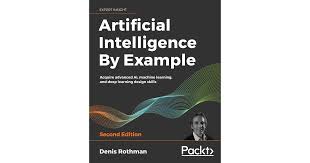Artificial Intelligence by Examples: An Expanded White Paper
1. Introduction
Artificial intelligence (AI) is no longer a futuristic concept. It's rapidly transforming industries and our daily lives. This white paper explores key AI concepts and showcases real-world applications through illustrative examples.
2. Core AI Concepts
- Machine Learning (ML): Algorithms that enable systems to learn from data without explicit programming.
- Supervised Learning: Trains models on labeled data to predict outcomes.
- Example: Spam detection in emails. The system learns to identify spam by analyzing labeled emails (spam vs. not spam).
- Unsupervised Learning: Discovers hidden patterns and structures in unlabeled data.
- Example: Customer segmentation. Grouping customers based on their purchase history and browsing behavior to tailor marketing campaigns.
- Reinforcement Learning: Agents learn by interacting with an environment and receiving rewards for desired actions.
- Example: Game playing. AI agents learn to play games like chess or Go by playing against themselves and receiving rewards for winning.
- Supervised Learning: Trains models on labeled data to predict outcomes.
- Deep Learning: A subset of ML utilizing artificial neural networks with multiple layers to analyze complex data.
- Example: Image recognition. Deep learning models can accurately identify objects, faces, and scenes in images.
- Natural Language Processing (NLP): Enables computers to understand, interpret, and generate human language.
- Example: Chatbots. AI-powered chatbots can simulate human conversation, providing customer support, answering questions, and even engaging in casual chit-chat.
3. AI Use Cases Across Industries
- Healthcare:
- Disease diagnosis: AI algorithms analyze medical images (X-rays, MRIs) to assist in diagnosing diseases like cancer.
- Drug discovery: AI accelerates drug development by identifying potential drug candidates and predicting their effectiveness.
- Finance:
- Fraud detection: AI models identify fraudulent transactions in real-time, protecting financial institutions and customers.
- Algorithmic trading: AI algorithms execute trades automatically based on market data and predictive models.
- Autonomous Vehicles:
- Self-driving cars: AI powers the perception, planning, and control systems of autonomous vehicles, enabling them to navigate safely and efficiently.
- Customer Service:
- Chatbots and virtual assistants: AI-powered chatbots provide 24/7 customer support, answering questions and resolving issues.
- Personalized recommendations: AI analyzes customer data to provide personalized product recommendations.
- Manufacturing:
- Predictive maintenance: AI algorithms predict equipment failures, minimizing downtime and optimizing maintenance schedules.
- Quality control: AI systems analyze images and sensor data to identify defects in products.
4. Ethical Considerations
- Bias and fairness: AI models can perpetuate biases present in the training data, leading to unfair or discriminatory outcomes.
- Transparency and explainability: Understanding how AI models make decisions is crucial for trust and accountability.
- Job displacement: Automation driven by AI may displace human workers in certain sectors.
- Data privacy and security: AI systems rely on large amounts of data, raising concerns about data privacy and security.
5. Conclusion
AI is a transformative technology with the potential to revolutionize numerous aspects of our lives. By understanding its core concepts and exploring its diverse applications, we can harness the power of AI responsibly and ethically to create a better future.
6. References
- [1] Russell, S., & Norvig, P. (2016). Artificial intelligence: A modern approach.
- [2] Goodfellow, I., Bengio, Y., & Courville, A. (2016). Deep learning.
- [3] Jurafsky, D., & Martin, J. H. (2000). Speech and language processing.
- [4] AI Now Institute. (2023). The AI Now Report 2023.
- [5] World Economic Forum. (2018). The future of jobs report 2018.
Note: This is a simplified overview. AI is a complex and rapidly evolving field with numerous subfields and nuances.
Disclaimer: The information provided in this white paper is for general knowledge and informational purposes only. It does not constitute professional advice.
This expanded white paper provides a more comprehensive overview of AI, including a broader range of use cases and a reference list for further exploration. contact ias-research.com for details.



